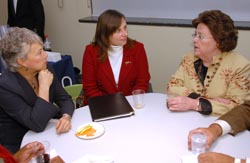|
The grants demonstrate the immense societal value of the work being done at the center, said Temple President Ann Weaver Hart.
“The number of older Americans leading active and fuller lives is on the rise,” said Hart. “The Center for Intergenerational Learning is a national leader in integrating the tremendous knowledge, energy and wisdom that they offer into the community.”
A three-year, $1.8 million grant from The Atlantic Philanthropies will support Coming of Age, a regional initiative that promotes 50-plus civic engagement, lifelong learning and community leadership. Created in 2002, Coming of Age is a partnership of CIL, WHYY, the United Way of Southeastern Pennsylvania, and AARP Pennsylvania.
This grant will enable Coming of Age to enrich its local offerings by expanding its web site, developing radio programming, and mobilizing teams of people 50-plus to address key community issues and to train nonprofits to engage them in paid and unpaid roles.
The initiative will place a strong emphasis on engaging and supporting people 50-plus from diverse communities in civic roles. The grant also will promote the national replication of Coming of Age.
“The initiative is a model that works,” said Dick Goldberg, director of Coming of Age. “We are excited about this opportunity to spread what we have learned in Philadelphia to communities across the country.”
A second, $1.2 million, three-year grant was just awarded by the W.K. Kellogg Foundation to expand Communities for All Ages (CFAA), a national community building initiative that seeks to improve the lives of children, adults and elders by addressing critical community issues from a multi-generational perspective.
Currently operating in 12 communities in Arizona, New York and Maine, Communities for All Ages focuses on transforming age groups from competitors to allies and encourages a collaborative approach to problem-solving among community organizations.
Diverse stakeholders work together to identify areas of common concern such as education, affordable housing and the environment, and develop strategies that benefit all generations. Intergenerational leadership programs, multi-generational community centers and innovative arts programming are among the many activities that have been successfully implemented.
The grant from Kellogg will support the expansion of this initiative into at least six additional communities and the creation of a vibrant CFAA national network that will foster cross-site learning.
— Written by Anna Nguyen
Renee Cree contributed to this report
|
